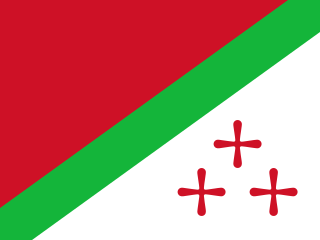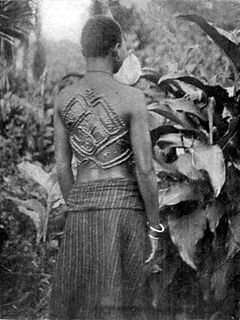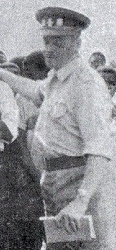| |||||
| Decades: | |||||
|---|---|---|---|---|---|
The following lists events that happened during 1959 in the Belgian Congo .
| |||||
| Decades: | |||||
|---|---|---|---|---|---|
The following lists events that happened during 1959 in the Belgian Congo .
| Date | Event |
|---|---|
| Theological School of Northern Congo (École de Théologie au Congo du Nord) is established (today University Shalom of Bunia). | |
| Protestant University in Congo is established in the neighborhood called Lingwala, in the Lukunga District of Kinshasa. | |
| 4 January | Riots break out in Léopoldville after police broke up a meeting of the independence group ABAKO. After two days, 47 people, all Congolese, had been killed and 379 Africans and Europeans had been injured. [1] |
| Parti Solidaire Africain is established after the Léopoldville riots. | |
| 10 November | Apostolic Vicariate of Léopoldville is elevated to Archdiocese of Léopoldville |
| 10 November | Apostolic Vicariate of Baudouinville is promoted as Diocese of Baudouinville (future Roman Catholic Diocese of Kalemie–Kirungu) |
| 15 November | Antipas Mbusa, future senior politician in the Democratic Republic of the Congo, is born in North Kivu. |
| 24 December | The colonial government in the Belgian Congo formally recognizes the legality of the Kimbanguist Church. [2] |

Patrice Émery Lumumba was a Congolese politician and independence leader who served as the first Prime Minister of the independent Democratic Republic of the Congo from June until September 1960. He played a significant role in the transformation of the Congo from a colony of Belgium into an independent republic. Ideologically an African nationalist and pan-Africanist, he led the Congolese National Movement (MNC) party from 1958 until his assassination.

The Congo Crisis was a period of political upheaval and conflict in the Republic of the Congo between 1960 and 1965. The crisis began almost immediately after the Congo became independent from Belgium and ended, unofficially, with the entire country under the rule of Joseph-Désiré Mobutu. Constituting a series of civil wars, the Congo Crisis was also a proxy conflict in the Cold War, in which the Soviet Union and the United States supported opposing factions. Around 100,000 people are believed to have been killed during the crisis.
Colonization of the Congo basin refers to the European colonization of the Congo Basin of tropical Africa. It was the last part of the continent to be colonized. By the end of the 19th century, the Basin had been carved up by European colonial powers, into the Congo Free State, the French Congo and the Portuguese Congo.
The Bemba belong to a large group of Bantu peoples mainly in the Northern, Luapula, Muchinga, the Northern part of Central Province. The Bantu also belong to the Copperbelt Provinces of Zambia who trace their origins to the Luba and Lunda states of the upper Congo basin called Kola, in what became Katanga Province in southern Democratic Republic of the Congo. The Bemba entered modern-day Zambia through crossing the Luapula River at Chipya in the Senior Chief Matanda's Chiefdom in Mansa _Luapula Province and that Chief Matanda and his Ushi people were the first to come into Zambia by the year 1328 from Kola. The collection of ethnicities known as Bemba have a ruling class called Abena Ng'andu. This clan traces its ancestry to Mbemba Nshinga who ruled Kongo from 1509-1543. Mbemba was called King Afonso l by the Portuguese whom he hosted in his kingdom for many years. They are one of the larger ethnic groups in Zambia. (A few other ethnic groups in the Northern, Luapula, and Copperbelt provinces of Zambia speak languages that are similar to Bemba but are not necessarily the same. For example, although the Lamba have the same roots as the Bemba, they never relied on the Bemba aristocracy for leadership. Indeed the Bemba people are not strictly indigenous to the Copperbelt Province, having rejoined the Lamba in that province in the 1930s when they went their in large numbers in search of employment opportunities brought about by the opening of large scale copper mines. In contrast members of the Bisa royal family are almost all descendants of Chitimukulu, as are many members of the Swaka and Lala aristocracies. Bemba history is a major historical phenomenon in the development of chieftainship in a large and culturally homogeneous region of central Africa.

The State of Katanga, also sometimes denoted as the Republic of Katanga, was a breakaway state that proclaimed its independence from Congo-Léopoldville on 11 July 1960 under Moise Tshombe, leader of the local Confédération des associations tribales du Katanga (CONAKAT) political party. The new Katangese state did not enjoy full support throughout the province and was constantly plagued by ethnic strife in its northernmost region. It was dissolved in 1963 following an invasion by United Nations Operation in the Congo (ONUC) forces, and reintegrated with the rest of the country as Katanga Province.

Henry Shelton Sanford was a wealthy American diplomat and businessman from Connecticut who served as United States Minister to Belgium from 1861 to 1869. He is also known for founding the city of Sanford, Florida and for successfully lobbying the United States into recognizing King Leopold II's claim to the Congo region in central Africa, the area that would become Leopold's privately controlled Congo Free State.
Paul Lomami-Tshibamba was a Congolese journalist and author, acclaimed as "the first giant of Congolese literature".

The Tetela people are a Bantu ethnic group of the Democratic Republic of the Congo, most of whom speak the Tetela language.

Bunkeya is a community in the Lualaba Province of the Democratic Republic of the Congo. It is located on a huge plain near the Lufira River. Before the Belgian colonial conquest, Bunkeya was the center of a major trading state under the despotic ruler Msiri.

Frederick Stanley Arnot was a Scottish missionary who did much to establish missions in what are now Angola, Zambia and the Democratic Republic of the Congo (DRC).
The following is a timeline of the history of the city of Kinshasa, Democratic Republic of the Congo.

Émile Robert Alphonse Hippolyte Janssens was a Belgian military officer and colonial official, best known for his command of the Force Publique at the start of the Congo Crisis. He described himself as the "Little Maniac" and was a staunch disciplinarian, but his refusal to see Congolese independence as marking a change in the nature of his command has been cited as the immediate cause of the mutiny by the Force Publique in July 1960 that plunged Congo-Léopoldville into chaos and anarchy.

The involvement of the Belgian Congo in World War II began with the German invasion of Belgium in May 1940. Despite Belgium's surrender, the Congo remained in the conflict on the Allied side, administered by the Belgian government in exile.
The following lists events that happened during 1960 in the Republic of the Congo (Léopoldville).

The Free Republic of the Congo, often referred to as Congo-Stanleyville, was a short-lived rival government to the Republic of the Congo (Congo-Léopoldville) based in the eastern Congo and led by Antoine Gizenga.
Maurice Mpolo was a Congolese politician who served as Minister of Youth and Sports of the Republic of the Congo in 1960. He briefly led the Congolese army that July. He was executed alongside Prime Minister Patrice Lumumba in Katanga in 1961.
Joseph Okito was a Congolese politician and close political ally to Patrice Lumumba who briefly served as First Vice-President of the Senate of the Democratic Republic of the Congo. He was executed alongside Lumumba in Katanga in 1961.

Democratic Republic of the Congo–Turkey relations are the foreign relations between the DR Congo and Turkey. Turkey has an embassy in Kinshasa since 1974, and the DR Congo opened its embassy in Ankara in 2011.
The Société anonyme belge pour le commerce du Haut-Congo (SAB) was a private enterprise in the Congo Free State, later the Belgian Congo, that operated a string of trading stations in the Congo River basin, and exported ivory, rubber and other local products. The ruthless treatment of the local people by SAB agents inspired Joseph Conrad to write his 1899 novel Heart of Darkness.